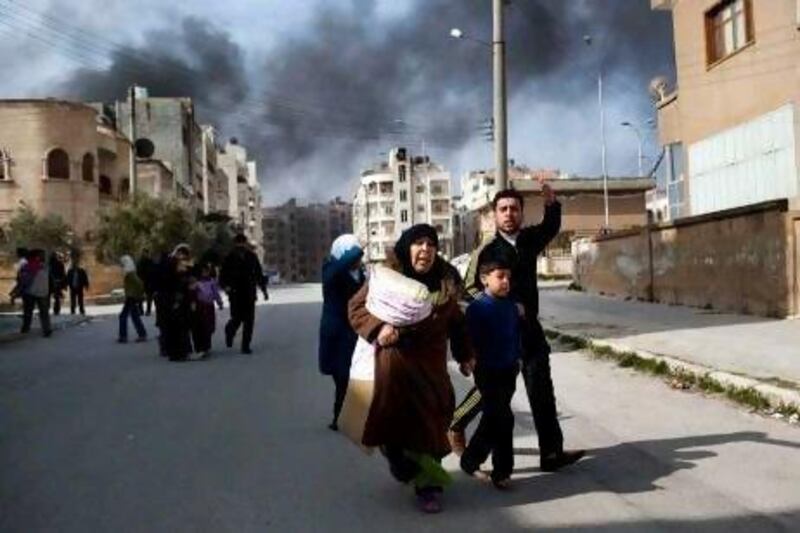beirut // There can be no political solution to the crisis in Syria while "armed terrorist groups" are destabilising the country, the Syrian president Bashar Al Assad told the United Nations envoy Kofi Annan yesterday.
As the two men met in Damascus, Mr Al Assad's forces turned their guns on the city of Idlib. Families fled as armed rebels tried to fend off the attack and thick black smoke billowed into the sky.
Troops encircled the city and bombarded it with dozens of tank shells from dawn until noon. Opposition fighters dashed through the streets, taking cover behind the corners of buildings in clashes with the troops.
Wounded fighters were pulled into trucks to be sped to clinics for treatment. A group of men used shovels to destroy speed bumps along one street to allow ambulances and other rescue vehicles to drive faster.
Military reinforcements have been pouring into Idlib this week, including dozens of tanks and armoured personnel carriers, activists said. Dozens of people have been killed in the area in recent days. At least 31 people died in Syria yesterday, 19 of them in Idlib, according to the Local Coordination Committees, a network of opposition activists. The figures cannot be verified.
The military operation has raised fears that the regime is turning its focus on Idlib after recapturing the rebel-held district of Baba Amr in a monthlong bombardment that killed hundreds and devastated the city of Homs.
Meanwhile in Damascus the Syrian leader held two hours of talks with Mr Annan, the former UN secretary general and the joint United Nations-Arab League special envoy to Syria.
"Syria is ready to make a success of any honest effort to find a solution for the events it is witnessing," Mr Al Assad told Mr Annan, according to the state news agency Sana.
"No political dialogue or political activity can succeed while there are armed terrorist groups operating and spreading chaos and instability."
Mr Annan did not comment on the meeting, the latest international effort to end a year of violence in which an estimated 7,500 people have died.
The Syrian government said in December that 2,000 members of its security forces had been killed by what it has continued to describe as "armed terrorist groups".
The UN secretary general Ban Ki-moon said on Friday that Mr Annan's priority was an immediate to halt all violence by the government and rebels - if not simultaneously, then first by government troops, followed by opposition fighters.
Mr Annan has also called for dialogue and a political solution - an initial proposal that was rejected by some oppositions groups, including the Syrian National Council, which said the time for talking was over.
At the Arab League in Cairo yesterday, the Russian foreign minister Sergei Lavrov rejected accusations that his country was providing cover for the Syrian government.
"We are not protecting any regimes," Mr Lavrov said. "We are protecting international law. We are not looking for a special prize or geopolitical interest here."
Russia's top diplomat also said his country was trying to "promote a peaceful resolution" to Syria's crisis and called for a ceasefire and humanitarian access.
Russia and China have been strongly criticised for vetoing two UN security council resolutions calling for tougher action against the Syria government, as well as refusing to join international calls for Mr Al Assad to step down.
Saudi Arabia's foreign minister Saud Al Faisal said yesterday that such failures at the UN had led only to more killings.
Also speaking in Cairo, Sheikh Hamad bin Jassim Al Thani, the Qatari prime minister, said some Arab states were no longer looking at the option of a ceasefire after the continued killings of civilians.
"There is systematic genocide by the Syrian government," he said.
Qatar has been among those calling for the Al Assad regime to be isolated and for military aid for Syrian rebel fighters.
As the crisis in Syria has worsened over the past 12 months, the uprising has taken on an increasingly armed dimension, with thousands of men now believed to be fighting for the rebel Free Syrian Army.
Last week, a Russian diplomat said the Syrian government was fighting Al Qaeda-backed militants, including 15,000 foreign fighters, something that mirrors the regime's narrative of who is behind the deteriorating situation in the country.
This idea was rejected yesterday by Sheikh Hamad.
"There are no armed gangs, the systematic killing came from the Syrian government side for many months," he told the Arab League meeting. "After that the people were forced to defend themselves so the regime labelled them armed gangs."
[ zconstantine@thenational.ae ]
*With additional reporting by Reuters, the Associated Press and Agence France-Presse






